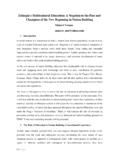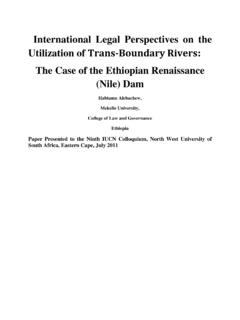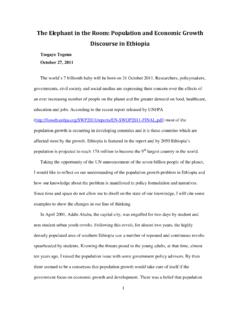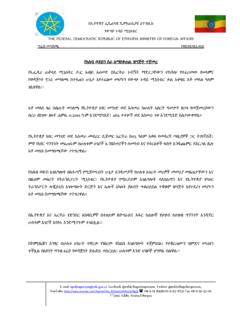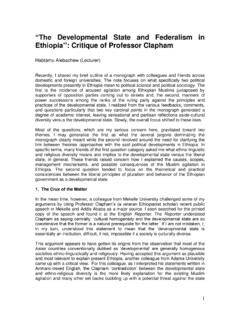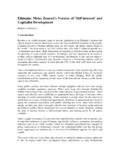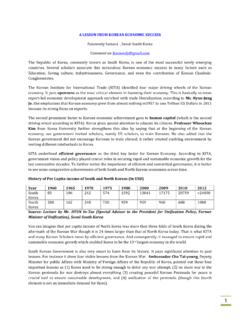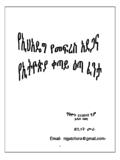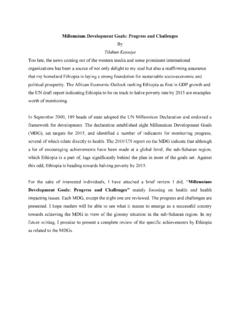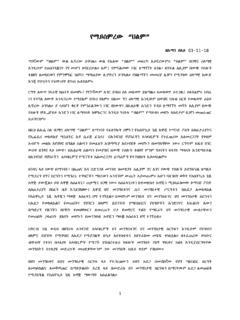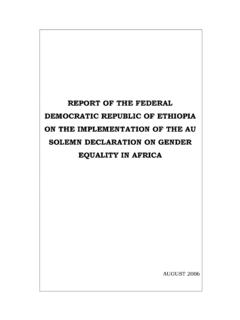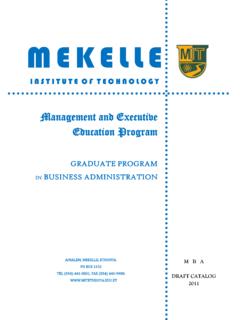Transcription of Ethiopia’s Foreign Affairs and National Security Policy ...
1 ethiopia 's Foreign Affairs and National Security Policy : The Case for a Paradigm Shift Alemayehu Fentaw . A good place to start a constructive critique is to look at the logical foundation of the Foreign Affairs and National Security Policy and Strategy (FANSPS) of the Federal Democratic Republic of ethiopia (FDRE) and subject it to the tests of consistency, coherence, and soundness. The FANSPS is premised on the proposition that Security Policy is a matter of ensuring National survival. The alpha and omega of Security is the ensuring of National survival. Other National Security issues may be raised only if National existence is ensured. Foreign Affairs and Security Policy must be formulated first and foremost to ensure National Security . Issues of prosperity, sustainable peace, and stability and other related concerns then follow. i Thus, the FANSPS's primary focus is on potential and actual threats to its territorial integrity.
2 It aimed primarily at protecting its sovereign frontiers against external aggression. Such being the logical foundation of the FANSPS, it becomes clear that non-military aspects of Security are relegated to a secondary place. This is not surprising given that securing its independence and territorial integrity has been the preoccupation of Ethiopian Foreign and National Security Policy for millennia. In view of the foregoing, it is no wonder that The Ethiopian National Defense Forces (ENDF) numbers about 200,000 personnel, which makes it one of the largest militaries in Africa. During the 1998-2000. border war with Eritrea, the ENDF mobilized strength reached about 350, The ENDF has its roots in the peasant-based EPRDF guerrilla army and is still in the process of being transformed into an all- volunteer professional military organization with the aid of the United States. The ENDF received training in peacekeeping operations, professional military education, military training management, counter-terrorism operations, military medicine, and unspecified military training funds from the United The ENDF is one of the largest military forces in Africa along with Egypt and Morocco, 29th largest in the world of 132 in terms of armed forces growth, and 11th out of 166 countries in terms of personnel.
3 Military expenditure for the year 2005 amounts to $800,000, and this places her on 56th position of The military expenditure was 3% of its GDP for 2006 and 49 th in the world v. Just about the time ethiopia went to war with the UIC in Somalia, it imported heavy weapons such as tanks and other armored vehicles from Russia (worth US$12 million) and China ($3 million) in 2006. and from North Korea ($3 million) and the Czech Republic ($1 million) in 2005. ethiopia also imported military weapons from China ($ million) in 2006 and Israel ($ million) in 2005. Besides, during 2005 and 2006, ethiopia had acquired a large range of small arms, light weapons and parts mainly from North Korea, China and On 13 April 2007 the Ethiopian Ministry of Foreign Affairs released a press statement,vii in response to an articleviii that was published in the New York Times which alleged that the US administration had allowed ethiopia to import arms from North Korea, in violation of the UN Security Council Resolution 1718 (2006),ix to support ethiopia 's military operations in Somalia.
4 The Ethiopian government acknowledged that a cargo shipment from North Korea to ethiopia had taken place on 22 January 2007, but denied that the content of the cargo violated UN Security Council Resolution 1718 imposing a partial embargo on the trade in arms with North Korea. The Ethiopian government said that the shipment contained spare parts for machinery and engineering equipment and raw materials for the making of assorted ammunition for small arms, and was made on the basis of four contractual agreements which were signed between 12 and 22 June 2006 for the purchase of various items required by the military industry in ethiopia . Furthermore irrevocable Letters of Credit were issued between 30. June and 30 September 2006. This means that all payments for the cargo were effected before the adoption of Resolution 1718. x The statement also stated that the US Embassy in Addis Ababa might have been aware of ethiopia 's importation of said cargo from North Korea but the assertion that "the United States allowed the arms delivery to go through in January in part because ethiopia was in the midst of a military offensive against Islamic militias inside Somalia is wrong since the contractual agreements were signed and all payments made before the ICU extremists in Somalia took control of Mogadishu and declared jihad on ethiopia .
5 Xi Against this backdrop, a cursory look at the Human Development Index (HDI) for ethiopia reveals an irony in contemporary Ethiopian political life. Although it is noteworthy that between 1995 and 2007 ethiopia 's HDI rose by annually from to , the HDI for ethiopia for the year 2007 is , which gives the country a rank of 171stout of 182 countries with Military Expenditure of ethiopia In local currency ( m. birr ). Year 1991 1992 1993 1994 1995 1996 1997 1998 1999 2000 2001 2002 2003 2004 2005 2006 2007 2008. Value [1,095] [716] [819] 813 754 803 1,512 3,263 5,589 5,075 2,959 2,476 2,397 2,686 2,965 3,007 3,253 3,750. In constant ( 2005 ) US$ m. Year 1991 1992 1993 1994 1995 1996 1997 1998 1999 2000 2001 2002 2003 2004 2005 2006 2007 200. Value [235] [139] [153] 141 119 134 246 518 821 741 471 388 319 346 342 309 285 262. As percentage of gross domestic product Year 1991 1992 1993 1994 1995 1996 1997 1998 1999 2000 2001 2002 2003 2004 2005 2006 2007.
6 Value [ ] [ ] [ ] 2 The figure for 1999 includes an allocation of 1 billion birr in addition to the original defense budget Source: SIPRI, 2009. Although the FANSPS explicitly fixes the country's maximum military expenditur e at 2%. of its GDP, it leaves a leeway for a flexib le implementation of the 2% ceiling depending on the level of threat during a given fiscal year. According to Stockholm International Peace Research Institute (SIPRI), ethiopia 's military expenditure under EPRDF has been well over 2% of its GDP, except for the years 1995, 1996 and The Central Intelligence Agency raises SIPRI's data for 2006 from to 3%.xiv Despite that, one of the most striking features of FDRE's FANSPS, at least on the face of it, is its emphasis on democratization and development. It also tells us about the threat to National Security posed by human rights abuses. In the words of the FANSPS: In the absence of a democratic order, National and religious divisions will invariably intensify, the abuse of human rights would result in strife, and poverty would spread further - a recipe for disintegration and destruction.
7 Nevertheless, the Government's bad human rights track record attests to the contrary. The thrust of my argument is that the central purpose of ethiopia 's Foreign and Security Policy has remained the same, in spite of the shift in orientation. A change in discourse has not brought about a change in practice. Human Security should have been made to constitute the basis of the FANSPS. Moreover, the Government should work aggressively to get a critical mass of women into leadership positions in the Foreign Affairs and Security sector. In the received discourse of international Affairs , the term " Security " connotes the protection of territorial integrity and dignity of the state. This is not surprising given the fact that hitherto, international relations has been more "state-centric" than "people-centric." Nevertheless, with the cessation of the Cold War and the advent of globalization in the international arena, the concept of Security is expanding to focus more on people than on the state.
8 Security , in its classical sense, refers to the Security of the state from external aggression. It is about how states use force to counter threats to their territorial integrity, their autonomy, and their domestic political system, primarily from other The classical formulation restricts the scope of Security to military threats from other states. Nevertheless, in its modern conception, Security is equated with the Security of individuals, not just Security of their nations or, put differently, Security of people, not just Security of territory. xvi The modern formulation gives primacy to the safety and well-being of all the people everywhere in their homes, in their jobs, in their streets, in their communities, in their environment ,xvii whilst the classical conception of Security emphasizes territorial integrity and National independence as the primary values that need to be protected. The latter has been related more to nation-states than to people.
9 Xviii What this conception overlooked was the legitimate concerns of ordinary people who sought Security in their daily lives. xix Human Security also encompasses a sense of personal choice and surety about the future and of personal efficacy and opportunity. Thus, in drawing attention to the difference between human Security and its cognate, human development, the Report argues that the latter is a broader concept and refers to a process of widening the range of people's choices, while the former implies that people can exercise these choices safely and freely and that they can be relatively confident that the opportunities they have today are not totally lost tomorrow .xx Along with a sense of choice and surety about the future, people should be efficacious and empowered enough to be able to take care of themselves: all people should have the opportunity to meet their most essential needs and to earn their own living. xxiThe Report lists seven aspects of human Security : economic Security , food Security , health Security , environmental Security , personal Security , community Security , and political Security .
10 Furthermore, the concept of human Security helps us understand that basic human rights, as stated in the international human rights instruments, are indivisible and inter-related. Sometimes, human rights are overridden or ignored for the sake of state Security . Human Security puts people first, emphasizing that human rights are central to state Security . Human Security complements human rights law by drawing attention to international humanitarian law in the context of armed conflict. However, the hitherto emphasis on sovereignty a la the classical approach to Security neglected other no less important aspects of Security such as ecological Security , energy Security , economic Security , food Security , and health Security . There has been a host of complex threats to the Security of the Ethiopian polity for so long including, but not limited to, poverty, widespread malnutrition, population explosion, the HIV/AIDS pandemic, degradation of the environment, loss of faith in institutions, uncontrolled urbanization/ rural-urban migration, insecurity of employment, brain drain, alienation of the youth, inflation and other economic disruptions.
